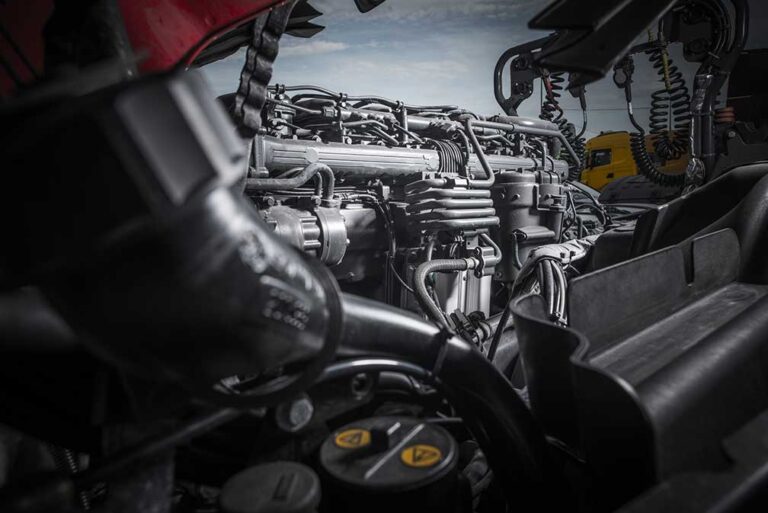On February 17, 2025, most of the U.S. was celebrating the President’s Day holiday. At Mobil Delvac, there was another reason to celebrate — the day marked the 100th anniversary of the Delvac product.
Back in 1925, “Mobiloil” was a brand name used by the Vacuum Oil Co., which also instituted the now-famous red Pegasus trademark. For their new diesel engine oil, the company chose the name DELVAC, an acronym for “Diesel Engine Lubricant by VACuum oil.” The Pegasus, or winged horse motif, originally used for marketing in South Africa, was so popular that the company adopted it for use everywhere.
A brief history of Mobil Delvac
Through the years, mergers occurred and the company offering Mobil Delvac changed names. It became the Socony-Vacuum Oil Co. after merging with the Standard Oil Company of New York (Socony) in 1931, then the Socony-Mobil Oil Co. in 1955 and, finally, the Mobil Oil Co. in 1966.
One more merger occurred in 1998, when Mobil merged with Exxon, previously Standard Oil of New Jersey. Today, the Mobil brand is owned by ExxonMobil.
Through all the mergers and acquisitions, the Delvac name remained. The Delvac name has since been adopted for other company products such as transmission fluid, coolant and grease products.
Mobil Delvac engine oils include organic, synthetic and blended options. The company has put together a legacy of innovation, improving current products and developing new ones to match developments in diesel engines and other vehicle components.
Today, the Mobil Delvac name is known around the world in the transportation, agriculture and automotive industries. To meet ever-changing lubricant requirements, Mobil Delvac engineers continue to evaluate new products at the company’s Clinton, New Jersey laboratory. The closer tolerances and higher heat production of today’s diesel engines are placing greater demands on engine oils and trusted brands like Mobil Delvac are ready.
Changing chemistry
In an interview with The Trucker, Michael Shea, technology principal of commercial vehicle engine oils at ExxonMobil, described some of the changes.
“The chemistry has evolved quite a bit since Mobil Delvac was first introduced 100 years ago,” he said. “In the early days of diesel engines, oils would typically need to be changed every 500-1,000 miles, today’s technology enables drain intervals of up to 100,000 miles.”
Those early lubricants were mostly base oil with few, if any, additives. “As technologies improved, various additives have been introduced to improve wear, cleanliness, sludge control, oxidation control, etc. to make up the modern engine oils we know today,” Shea remarked. “Mobil Delvac is constantly being tested in the lab and on the road to ensure we have well-balanced formulations to meet the needs of our customers.”
Engine manufacturers are continuously refining their products, placing greater demands on lubricants and other fluids to protect them from wear and help them run clean.
“We work closely with engine manufacturers as they design their new platforms to make sure Mobil Delvac is ready for the demands of new engine technology,” Shea said. “New engine technologies are evolving to produce reduced emissions which requires oil technology to change to meet these demands.”
Keeping up with new technologies sometimes means getting ahead of them, rather than waiting to react once new requirements are announced.
“As we tend to formulate our products to extend beyond the minimum industry requirements, we are well positioned to meet new specifications when they are introduced,” Shea said.
Preparing for the engines of the future
As the future of internal-combustion engines is debated, fuels other than diesel fuel are under consideration. Natural gas and propane are already used to power some engines, and hydrogen has been tested as a combustion fuel, too.
Shea says that Mobil Delvac is also prepared for new fuels.
“Through our long-standing relationships with engine builders, we stay engaged with them as they work to develop the engines of the future,” he said.
“We’ve had oils for natural gas engines for many years going back to when these engines were first used in buses,” Shea continued. “Our latest line of Mobil Delvac Modern CNG/LNG products is formulated for use in natural gas and diesel engines, allowing mixed fleets to utilize a single oil for their diesel and natural vehicles.”
Hydrogen combustion is a little more complicated, Shea explained.
“Hydrogen as a fuel poses some interesting challenges,” he said. “The temperatures and pressures experienced by the oil in the combustion chamber of the engine are much higher. This puts a lot of stress on the oil, so we have been testing different ways to handle these severe conditions.”
There’s another condition that happens with hydrogen that users of diesel and natural gas don’t have to deal with.
“When you combust hydrogen, you are also producing water, so the oil will need to have adequate water handling and rust protection,” Shea said. “We remain engaged with OEMs as they continue their developments in this area, and we keep a close eye on industry trends to make sure we are well suited to deliver the technologies required for the future.”
Finally, even vehicles powered by electricity, whether from a battery or hydrogen fuel cell, still have lubrication requirements.
“Electric and hydrogen fuel cells have unique lubrication challenges. These include providing superior lubrication to the reduction gearbox and the ability to cool the electric motor and power electronics if needed,” he said. “Our Mobil EV products are designed to help extend battery life and reduce charging requirements through energy-efficient lubricants.”
Save during the 100-year celebration
In celebration of its 100th anniversary, Mobil Delvac is offering special rebates on its products through April 30, 2025. The Mobil Delvac rebate program runs through April 30, 2025. Purchasers will receive a Mobil Delvac Prepaid Visa Card for an amount ranging from $5.00 to $40, depending on the product purchased and container size. The maximum rebate is $100, and purchases must be made from participating retailers. Purchases from Amazon or made as part of an oil change service are not valid. For details, click here.
From the first diesel-powered vehicles to the commercial vehicles of tomorrow, Mobil Delvac continues to refine its products to help the trucking industry get the most from its equipment.
Cliff Abbott is an experienced commercial vehicle driver and owner-operator who still holds a CDL in his home state of Alabama. In nearly 40 years in trucking, he’s been an instructor and trainer and has managed safety and recruiting operations for several carriers. Having never lost his love of the road, Cliff has written a book and hundreds of songs and has been writing for The Trucker for more than a decade.








